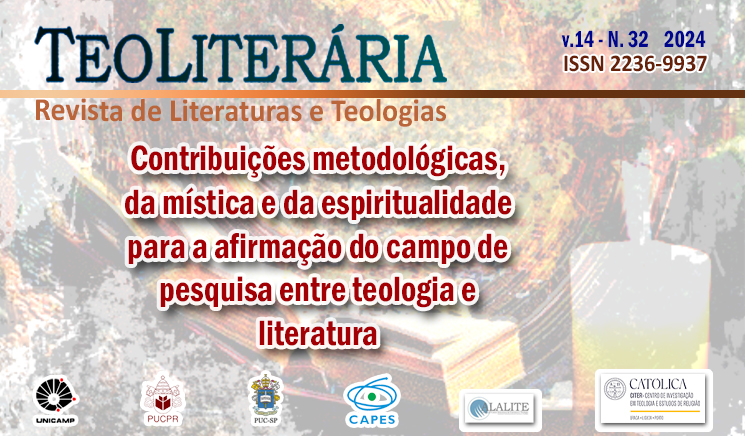The dialogue between human beings and nature in Buber and Pope Francis
Connections & Language
DOI:
https://doi.org/10.23925/2236-9937.2024.64856Keywords:
Dialogue, Relationship, Nature, Creation, Martin Buber, Pope FrancisAbstract
Martin Buber, in his philosophy of dialogue, highlights that human beings can establish a relationship with nature. Pope Francis in Laudato si’ infers that human beings can establish dialogue with the earth (Creation). In this sense, this article seeks to develop existing connections between both authors on the following points: 1) there is divine revelation in Creation; 2) recognition of the intrinsic value of each creature is necessary; 3) the ability to contemplate nature is important, which generates appreciation and encounter; 4) it is urgent to correct a unilateral anthropocentrism that reduces creatures as an It (object); 5) it is necessary to have a virtuous life in relation to nature, which is the ability to invoke affections and conscience in front of others; 6) the ability to listen to the word spoken by nature itself, which communicates even through silence, is essential; 7) the language of fraternity and beauty; Such language creates relationships, is educational and has transformative power.
References
BARBOSA, I. M. Profetismo ecoteológico do Papa Francisco diante das feridas socioambientais atuais. Revista Espaços vol. 28, n. 1, p. 51-64, 2020. Disponível em: <https://www.espacos.ittesp.com.br/index.php/espacos/article/view/718/604>. Acesso em: 01 de dezembro de 2020.
BARTHOLO JR., R. Você e Eu: Martin Buber, presença palavra. ed. Rio de Janeiro: Garamond, 2001.
BÍBLIA De Jerusalém. São Paulo: Paulus, 2002.
BUBER, M. Do diálogo e do dialógico. São Paulo: Editora Perspectiva, 1982.
BUBER, M. EU e TU. Trad. Newton Aquiles von Zuben. 10ª ed. São Paulo: Centauro Editora, 2006.
BUBER, M. Encontro: Fragmentos Autobiográficos. Trad. Sofia Inês Albornoz Stein. 4ª ed. Petrópolis: Vozes, 1991.
FRANCISCO, Papa. Laudato si’: encíclica sobre o cuidado da Casa comum [LS, 2015]. Disponível em: <https://www.vatican.va/content/dam/francesco/pdf/encyclicals/documents/papa-francesco_20150524_enciclica-laudato-si_po.pdf>. Acesso em: 2 de fev. 2023.
FRANCISCO, Papa. Laudate Deum: exortação apostólica sobre a crise climática [LD, 2023]. Disponível em: <https://www.vatican.va/content/francesco/pt/apost_exhortations/documents/20231004-laudate-deum.html>. Acesso em: 5 de out. 2023.
MURAD, A. Encantamento: uma chave da consciência planetária à luz da Ecoteologia. Revista Paralellus vol. 4, n. 8, p. 137-151, 2013. Disponível em: <http://www.unicap.br/ojs/index.php/paralellus/article/view/282/pdf>. Acesso em: 01 de dez. 2020.
MURAD, A. O núcleo da ecoteologia e a unidade da experiência salvífica. Revista Pístis & Práxis vol. 1, n. 2, p. 277-297, 2019. Disponível em: <https://periodicos.pucpr.br/index.php/pistispraxis/article/view/10658/10055>. Acesso em: 01 de dez. 2020.
PONTIFÍCIO CONSELHO JUSTIÇA E PAZ. Compêndio de Doutrina Social da Igreja [PCJP, 2004]. Cap. X – Salvaguardar o ambiente. Disponível em: <https://www.vatican.va/roman_curia/pontifical_councils/justpeace/documents/rc_pc_justpeace_doc_20060526_compendio-dott-soc_po.html#SALVAGUARDAR%20O%20AMBIENTE>. Acesso em: 4 de out. 2023.
SILVA, M. R. O diálogo como fundamento da existência e das relações humanas no pensamento de Martin Buber. Trabalho de Conclusão de curso – monografia. Maringá: PUC PR, 2011, 78fg.
VON ZUBEN, N. A. Martin Buber: Cumplicidade e diálogo. ed. Edusc: Bauru - SP, 2003.
WHITE, L. The Historical Roots of Our Ecological Crisis, 1967. Disponível em: < https://www.cmu.ca/faculty/gmatties/lynnwhiterootsofcrisis.pdf>. Acesso em: 04 de out. 2023.
Published
Versions
- 2024-12-25 (2)
- 2024-12-15 (1)
How to Cite
Issue
Section
License
Copyright (c) 2024 TEOLITERARIA - Revista de Literaturas e Teologias

This work is licensed under a Creative Commons Attribution 4.0 International License.
TeoLiteraria – Journal of Literatures and Theologies owns the copyright of all published material. The whole reproduction of the articles of this Journal in other publications or for any other purpose, by any means, requires a written permission of the editor of this journal. Partial reproductions of articles (abstracts, more than 500 words text, tables, figures and other illustrations) must have a permission written by the publisher and the authors.

